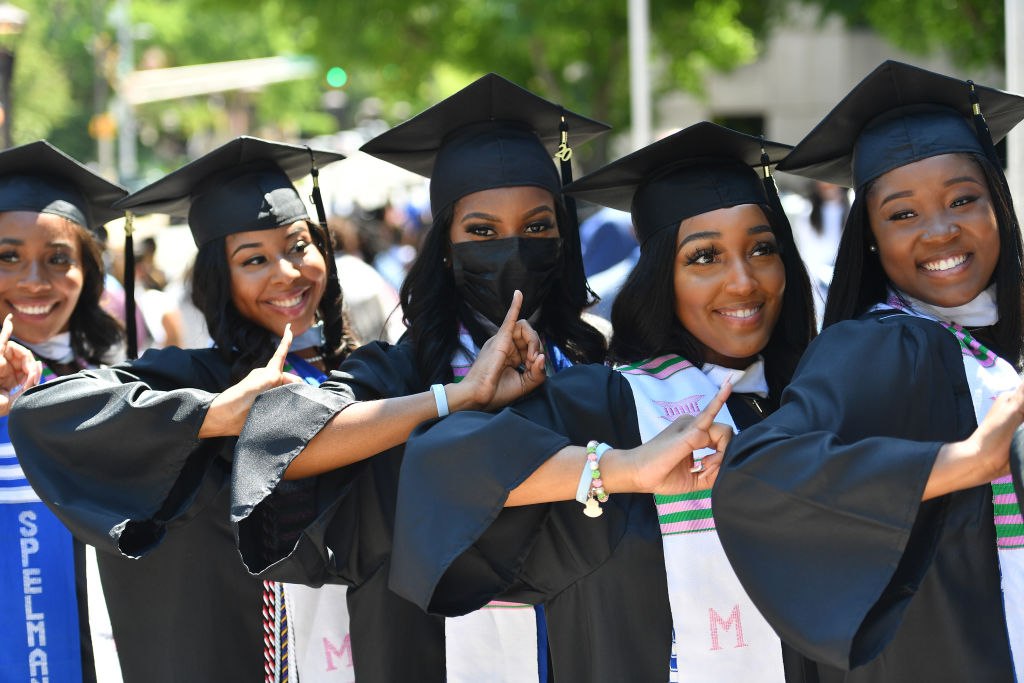
Source: Paras Griffin / Getty
Historically Black Colleges and Universities have produced some of the most talented, successful and influential individuals of our time. Vice President Kamala Harris, Sean “Diddy” Combs and Oprah Winfrey all attended HBCUs. On this episode of Listen to Black Women, host Taryn Finley is joined by three HBCU alumni who truly embody the saying “From the yard to infinity” and who used what they learned in college to do great things.
Today’s guests include Kala Riggins, a content marketing strategist who attended Clark Atlanta University; Asia Milia, a fashion writer for New York Magazine who attended Hampton University, and Maya Allen, a beauty director who attended Howard University.
The Path To And From HBCU
Riggins grew up in New Orleans in a predominantly Black culture until hurricane Katrina displaced her and her family, landing her in mostly white high schools. It was during that time that she knew she wanted to re-immerse herself in a Black academic setting.
“I wanted to make sure that I surrounded myself with as much of the Black experience as possible for as long as I could,” says Riggins.
Milia grew up in New York City which she describes as a “melting pot.” However, very few students at her high school were Black. When her cousin attended Hampton University and raved about the energy and the experiences, Milia wanted to see what it was all about for herself. She was the first person in her family to graduate from college.
“I’m gonna do this for us,” she told herself
Allen grew up in Portland, where she was mostly surrounded by white people. Her sister introduced her to HBCUs when she attended Spelman. Allen chose to go to Howard University.
“When I stepped onto Howard’s campus I was just immersed in this sea of Black excellence and Black beauty. I was so inspired.”
Do HBCUs Lack Diversity?
Thirteen percent of HBCU students are not Black. Finley asked what the guests thought of this stat and asked if students are underexposed to diversity by attending an HBCU?
All three women strongly agree that there is a tremendous amount of diversity within the Black community.
“I learned more about diversity…about Blackness … about the world … in those four years than I had ever before,” says Finley.
They also bring up the historical reason that HBCUs exist in the first place: Black students were once excluded from white schools. Systemic issues tracing back to that time still exist, which is why HBCUs are significant.
HBCUs Are Relevant
Finley drops the fact that some members of society have started to assert that HBCUs are “irrelevant” today. Her guests disagree. An HBCU, for them, provided the first safe place they felt fully free to be themselves and explore their identity, without the limitations put on them by white society. Finding that identity was critical to their success in corporate America, post-college.
“I was better equipped to handle it [the corporate world] because of the pride that I have in who I am based on my HBCU experience,” says Riggins.
Finley, Riggins, Milia and Allen are Delta sorority sisters, and that also played a large role in their development. Seeing so many Black women who were powerful, assertive and true to themselves gave them the confidence to go off into the professional world.
HBCUs are and always will be very relevant. “We need HBCUs. The world needs us,” says Milia.
More Than A Teacher
The women discuss their HBCU professors, who they all agree were so much more than teachers. They were their mentors. They were also adults who understood what it meant to be a Black professional in today’s world and who wanted to prepare their students for the experiences to come. Each woman truly felt that their professors wanted to see them succeed.
“You weren’t just a number,” says Riggins. “Your professors knew you by name.”
Riggins says she’s still FaceBook friends with many of her professors to this very day.
Follow MADAMENOIRE on Instagram, Facebook Twitter and YouTube to catch the next episode of Listen To Black Women.









